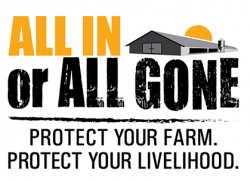Georgia Poultry Federation Launches Avian Influenza Campaign
 The Georgia Poultry Federation is working to stay ahead of any outbreak of the avian influenza virus in our state and has launched a new campaign for poultry farmers.
The Georgia Poultry Federation is working to stay ahead of any outbreak of the avian influenza virus in our state and has launched a new campaign for poultry farmers.
It’s called, “All In or All Gone.”
“All in” means all poultry farmers and poultry producers practicing biosecurity measures all of the time.
Mike Giles is the President of the Georgia Poultry Federation.
Giles said his group has been working all summer to educate poultry farmers on what they can do to prevent the spread of this deadly virus.
“We’re working on two fronts,” Giles said. “One is education and outreach, stressing biosecurity at the farm level and with the producer. And the other is working with our State and federal partners, the Georgia Department of Agriculture and the USDA to prepare and be ready to respond if the avian influenza virus makes it way into Georgia.”
The Avian Influenza virus is carried by wild waterfowl and was brought to North America by Asian waterfall that crossed into Canada.
Now it’s carried by wild waterfowl and has already spread to poultry houses in Minnesota, Iowa and Wisconsin where it wiped out around 60-million birds last winter.
The virus is spread typically during the winter months when wild waterfowl migrate South.
Giles said his office, the USDA and the Georgia Dept of Agriculture have been working to educate poultry farmers on what they can do to keep the virus out of their flocks.
“One of the most important things is making sure everyone is on alert and knows the signs of avian influenza virus,” he said. “They need to understand the signs so they know if their flock is infected with the avian influenza and they’re encouraged to contact the company they contract with as soon as they have a suspicion.”
Additionally, the Federation, USDA and other state and federal agencies are working with the Georgia DNR to monitor wild waterfowl and their movements in the State.
“One of the things the DNR is doing is surveillance on wild waterfowl so we know if the birds are carrying the virus,” Giles said. “Also the DNR has provided tips for farmers on what to do to keep geese and other wild water birds off their properties.”
Giles said the U.S. Department of Agriculture’s Animal and Plant Health Inspection Service (APHIS) has also released a “Checklist for Self-Assessment of Enhanced Poultry Biosecurity” and training materials as part of ongoing preparation efforts for highly pathogenic avian influenza (HPAI).
The documents can assist the poultry industry in implementing effective biosecurity practices.
APHIS collaborated with state, academic and industry experts to develop the checklist and training materials, which are posted on the U.S. Poultry and Egg Association website at http://www.uspoultry.org/.
